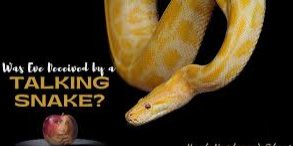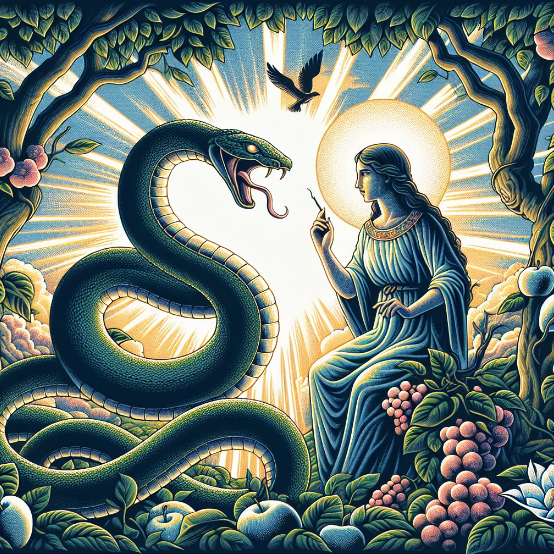THE SERPENT CASTS A SHADOW OF DOUBT ON THE WORD OF GOD
We come now to what some consider to be the most important chapter of the Bible. It is conceded, I believe, by all conservative expositors to be just that.
Chapter 3, is believed to be the pivot of the Bible. If you doubt that, read chapters 1 and 2 of Genesis, omit chapter 3, and then read chapters 4–11.
You will find that there is a tremendous vacuum that needs to be filled, that something has happened.
For instance, in Genesis 1 and 2, we find man in innocence; everything is perfection, and there is fellowship between God and man.
But the minute you begin with chapter 4 of Genesis and read just as far as chapter 11, you find jealousy, anger, murder, lying, wickedness, corruption, rebellion, and judgment.
The question is: Where did it all come from?
Where did it begin?
Where did the sin originate?
Actually, I do not think it originated in chapter 3 of Genesis, but as far as man is concerned, here is where it began.
Let me quote for you the statement of another concerning chapter 3:
Here we trace back to their source many of the rivers of divine truth. Here commences the great drama which is being enacted on the stage of human history and which well nigh 6,000 years has not yet completed.
Here we find the divine explanation of the present fallen and ruined condition of our race. Here we learn of the subtle devices of our enemy, the devil.
Here we behold the utter powerlessness of man to walk in the path of righteousness when divine grace is withheld from him.
Here we discover the spiritual effects of sin, man seeking to flee from God. Here we discern the attitude of God toward the guilty sinner.
Here we mark the universal tendency of human nature to cover its own moral shame by a device of man’s own handiwork.
Here we are taught of the gracious provision which God has made to meet our great need. Here begins that marvelous stream of prophecy which runs all through the Holy Scriptures.
Here we learn that man cannot approach God except through a mediator.
In this first section we have the setting for the temptation of man.
Genesis 2 ended with the last glimpse of a sinless world. Adam and Eve are perfect in themselves, in their purpose, and in their relationship as husband and wife.
Chapter 3 tells the story of that paradise lost; the result of the first willful human sin. The consequences: immediate shame and lifelong separation from their home with God.
Chapter 4 will describe the beginning of their lives together, the beginning of the painful story of human history.
Genesis 3:1-3 KJV
[1] Now the serpent was more subtil than any beast of the field which the LORD God had made. And he said unto the woman, Yea, hath God said, Ye shall not eat of every tree of the garden?
[2] And the woman said unto the serpent, We may eat of the fruit of the trees of the garden:
[3] But of the fruit of the tree which is in the midst of the garden, God hath said, Ye shall not eat of it, neither shall ye touch it, lest ye die.
Genesis 3:1
Now the serpent was more subtil than any beast of the field which the LORD God had made. And he said unto the woman, Yea, hath God said, Ye shall not eat of every tree of the garden?
The question arises: Why the temptation?
If we go back to chapters 1 and 2, we find that man was created innocent, but man was not created righteous.
What is righteousness?
Righteousness is innocence that has been maintained in the presence of temptation. You see, temptation will either develop you or destroy you; it will do one of the two. The Garden of Eden was not a hothouse, and man was not a hothouse plant.
Character must be developed, and it can only be developed in the presence of temptation. Man was created a responsible being, and he was responsible to glorify, to obey, to serve, and to be subject to divine government.
Man did not create himself—I do not think anyone claims that—but God created him. And God was not arbitrary in the condition which He laid down. He said to man, “But of the tree of the knowledge of good and evil, thou shalt not eat of it: for in the day that thou eatest thereof thou shalt surely die” (Gen. 2:17).
That tree was not the only tree in the garden to eat of. It would have been very arbitrary if man would have starved to death if he had not been able to eat of the tree and if he had also been told he would die if he did eat of it.
There was an abundance of trees in the garden which bore fruit; so that man did not need to eat of this tree at all. Therefore, we find that man appears on the scene a responsible creature. In this first verse we are introduced to the serpent.
Immediately the question can reasonably be asked, “Where in the world did he come from?
How did he get into the Garden of Eden?”
As far as I can tell from the Word of God, the serpent was not there as a slithering creature. Actually, we are not told how he came there; we are just told he was there. The Word of God leaves a great deal out.
The serpent was a creature that could be used of Satan, and Satan used him.
Isn’t that exactly the method that Satan uses today?
Paul wrote to the Corinthians: “And no marvel; for Satan himself is transformed into an angel of light” (2 Cor. 11:14). The Book of Revelation says more about Satan than anywhere else in Scripture.
“And the great dragon was cast out, that old serpent, called the Devil, and Satan, which deceiveth the whole world: he was cast out into the earth, and his angels were cast out with him” (Rev. 12:9).
This creature was not a slithering snake as we think of it today. That is not the picture that the Word of God gives of him at all.
“And he laid hold on the dragon, that old serpent, which is the Devil, and Satan, and bound him a thousand years” (Rev. 20:2).
This is a creature with tremendous ability. There is no record of his origin here in Genesis at all. I believe that Isaiah 14 and Ezekiel 28 give us the origin of this creature and also how he became the creature that he was.
The word “subtle,” as used here, is not negative, but rather positive; everything that God made before the Fall was positive; it describes qualities such as quickness of sight, swiftness of motion, activity of self-preservation, and seemingly intelligent adaptation to its surroundings.
Not a fable; the serpent before the Fall had the ability of limited speech; Eve did not seem surprised when he spoke to her! The serpent evidently lent its faculties to Satan, even though the Evil One is not mentioned. That being the case, Satan spoke through the serpent, and questioned the Word of God.
The previous two chapters described God’s creation of the universe and how fully He provided for the first two human beings. Genesis chapter 3 turns to describing how they became separated from God.
In this verse, a new character is introduced: the serpent. Who is he, and where did he come from? We have no reason to assume that animals possessed the power of speech and reason at this time. Still, some commentators remark that the woman—later named Eve—seems oddly unsurprised when the serpent speaks to her.
Others point out that many conversations recorded in the Bible appear to be summaries, not word-for-word transcripts. The actual discussion might well have taken longer than what’s recorded here.
We’re told the serpent is the most crafty or shrewd of all the wild animals. This is from the Hebrew term ā’rum, which also means “prudent” or “sly.” The term, itself, is not necessarily negative. However, as with any gift or ability, how one chooses to use it makes the difference between sin and righteousness.
In this case, the serpent uses “craftiness” in order to ruin mankind. After the fall God specifically curses the serpent (Genesis 3:14–15). Not all Bible scholars agree, but most understand this speaking serpent to be Satan himself. As a result, conservative Bible teachers generally hold one of two interpretations.
First, that Satan possessed and spoke through a serpent created by God.
Second, that Satan took on the form of a serpent for the purpose of tempting the woman to sin. That seems consistent with what we know of Satan from other passages in the Bible. First of all, Satan and the other demons are spiritual beings, not physical, but with the ability to take control of both people (Luke 22:3) and animals (Mark 5:11–13).
Jesus describes Satan as the Father of lies (John 8:44), and Genesis 3 describes the first recorded lies to be heard on earth. Finally, Revelation refers to Satan as a dragon, the “ancient serpent” or “serpent of old” (Revelation 12:9; 20:2).
His first recorded words to the woman challenge God’s commands with a simple question, casting doubt on God’s words. The serpent seems to either misstate or question God’s restrictions about what she and the man could eat: “Did God actually say, ‘You shall not eat of any tree in the garden’?”
It will become clear the serpent knows exactly what God had commanded. His intent is to provoke Eve to judge God’s fairness.
Genesis 3:2
And the woman said unto the serpent, We may eat of the fruit of the trees of the garden:
Why in the world did the serpent approach the woman?
Why didn’t he approach the man?
When God created Adam, He had told him that he could eat of every tree of the garden, but of this one he was not to eat. Woman was created last, and she had gotten her information secondhand; she had gotten it from man.
And so the serpent approached woman first. Frankly, I think that woman was created finer than man; that is, she had more compassion and sympathy in her makeup. She was probably more open to suggestion than the man.
Actually, I think a woman has a nature that is more inquisitive than a man’s. She is the one today who goes into the cults and isms more than anyone else and leads men into them. In fact, many of the founders of cults and isms have been women.
Satan knew what he was doing. Notice what he did. He had a very subtle method as he came. He asked her this question, which cast doubt on the Word of God, “Yea, hath God said, Ye shall not eat of every tree of the garden?”
He raises a doubt in her mind and excites her curiosity. Proclaims Satan leveling his attack against Eve, instead of Adam; his use of Eve was only a means to get to Adam.
The trial of our first parents was ordained by God, because probation was essential to their spiritual development and self-determination; but as He did not desire that they should be tempted to their Fall, He would not suffer Satan to tempt them in a way that would surpass their human capacity; the tempted might, therefore, have resisted the tempter.
In the previous verse, the crafty serpent—most likely Satan in control of an animal, or taking on an animal form—began his temptation of the first woman. This conversation is his attempt to convince her to disobey God.
He starts with a question he knows the answer to, one apparently intended to draw her into judging God’s character. This begins by encouraging her to consider, or even to doubt, God’s command: Did God really say you can’t eat from any tree in the garden?
Verses 2 and 3 describe the woman’s response. She immediately corrects the serpent: “We may eat the fruit of the trees in the garden.” This part of the response is all well and good.
Her answer is correct, but getting her to talk is part of the Devil’s trap. The end of her response, in the following verse, shows the woman doesn’t have a clear understanding of God’s command.
Genesis 3:3
But of the fruit of the tree which is in the midst of the garden, God hath said, Ye shall not eat of it, neither shall ye touch it, lest ye die.
She answers, “We can eat of all the trees, but this tree God has told us, ‘Ye shall not eat of it [that’s all God had said, but she added something], neither shall ye touch it, lest ye die.’ ” I did not find where He ever said, “You are not to touch it.”
Eve quoted what the Lord had said about the prohibition, but then added, “neither shall you touch it”. The thing that Eve did was to add to the Word of God. The liberal and the atheist take from the Word of God, and God has warned against that.
The cults (and some fundamentalists, by the way) add to the Word of God, and God warns against that. There are those who say that today we are saved by law. They argue, “Yes, it is by faith, but it is faith plus something else”—and they are apt to come up with anything.
In verse 1, the serpent questions the commands of God by asking the woman a slanted question: Did God really say you could not eat fruit from any tree in the garden?
In verse 2, she begins to answer, and at first her answer seems solid. She correctly responds that no, they could eat fruit from trees in the garden. She then concludes her answer with God’s actual restriction. However, she doesn’t seem to quote it exactly right. This reflects just enough doubt over God’s words to give Satan an opportunity.
Here’s what God said to Adam about what not to eat in Genesis 2:16–17: “You may surely eat of every tree of the garden, but of the Tree of the Knowledge of Good and Evil you shall not eat, for in the day that you eat of it you shall surely die.”
The woman, either by accident or out of sincerity, added an extra layer to God’s statement. The restriction that they were not even allowed to touch the tree wasn’t part of God’s actual command.
Either Eve, as the woman would later be known, did not fully understand the command, she misremembered it, or she intentionally misquoted it in an effort to be more emphatic.
Instead of bolstering her willingness to obey, this addition to the words of God actually makes Satan’s strategy more effective. In the context of this conversation, her error makes God appear even more restrictive than He is.
The serpent will quickly zero in on the issue of God’s character, His honesty, and His fairness.
I hope that you have really enjoyed this post,













My God is wonderful and he does great things.
Good morning to you with the love from the Lord. This is a good teaching today and I am able to learn something new as well about how the serpent was able to convince the humans to eat of the fruit of the tree of the knowledge of Good and Evil.
Here, I’m able to understand the evil that can come with disobedience.
Hi, I hope you are doing well,
I’m glad you liked this page on Genesis – 3 – Holy Bible Study. I’m glad I can display my thoughts about these Biblical events on this platform, and know that there are people like yourself who can get something out of it.
Thanks for taking the time to read it. And I hope you’ll enjoy future post on jmj45tech.com as well.
Abundant Regards To You My Friend!
Such an interesting read about the knowledge you have about this information from God.
Be blessed that you have shared this information with so many to truly understand what happened in chapter 3.
I remember learning of Adam and Eve, as well the serpant as a youth, and to this day it always sticks as one of the long lost forgotten lessons we should and must remember.
Hello,
I really appreciate your comment, Thank you for stopping by.
Blessings,
Jerry
I love this topic.
I love the book of Genesis. It’s right up there with the other 65 books of the Bible. You stated, “Character must be developed, and it can only be developed in the presence of temptation.”
We know that it is impossible for God to temp up (James 1:13).
God does allow us to be tempted but he also gives us trials and tribulations. I agree that victory or character can be developed in the midst of temptation, but I also believe character can be developed in the midst of trials and tribulations.
I am in total agreement with you when you said, “I believe that Isaiah 14 and Ezekiel 28 give us the origin of this creature and also how he became the creature that he was.” Absolutely.
I thank you for this article. Keep writing, keep sharing the gospel.
Blessings,
Mike
Hello Mike,
Thank you for taking a portion of your valuable time to comment on this episode.
I am not sure what “We know that it is impossible for God to temp up (James 1:13)” means. I double checked the scripture concerning that verse, and then I read the whole chapter again.
I have concluded that temptation comes from satan and not GOD.
GOD’s desire for us is to trust Him more, and more deeply. A person’s actions are a good indicator of what kind of “faith” they really have.
Biblical saving faith is not mere intellectual knowledge—it is trust. A faith that saves is the kind of faith which naturally produces action, and this is the point of James’ writing. As this book emphasizes our works as believers, the point is that those works are acts of faith.
Put another way, people who trust God naturally obey God.
Why wouldn’t they if they believe Him?
Saved people believe in Christ, and people who believe in Christ follow the way of Christ. Saving faith is trust which produces action.
Thanks Again For Your Time and Ecouragement,
Blessings To You My Friend!
This is an excellent summary of the serpent and his purpose.
I was raised independent Baptist and have reviewed this material many times over the years and it is always good to get a fresh perspective.
Keep up the good work. God is by your side!
I think there are valuable principles here that have stood the test of time and help guide us today!
Brian
Hello Brian,
Thank you for stopping by and commenting on this episode of The Pivot Of The Holy Bible – The Serpent Deceives Eve.
Thank you for considering this an excellent summary of the serpent and his purpose.
I agree with getting a fresh perspective. It seems to me, that I can study scripture, get one meaning of it. Then I can study that same scripture some time later and see something in it that I did not see before.
Maybe it is Spiritual Growth, Holy Spirit guidance, or maybe even both. What ever it is, I am thankful for it.
Thank you for your support,
Blessings My Friend!
In terms of overcoming doubts or skepticism about the word of God, individuals may find comfort in seeking guidance from religious leaders or engaging in prayer and reflection.
It is also important to approach religious texts with an open mind and a willingness to learn and grow in one’s faith.
There are many other biblical stories that address the theme of doubt and faith, such as the story of Thomas in the New Testament, who doubted the resurrection of Jesus until he saw him for himself.
These stories can provide valuable insights into the nature of faith and the challenges that believers may face in their spiritual journeys.
Hello Akumendoh,
Thank you for utilizing a portion of your time to comment on The Pivot Of The Holy Bible – The Serpent Deceives Eve.
Your comment is very interesting, indeed. I agree with what you have said, and it also true in my opinion, that there are many challenges that believers will face in our spiritual journeys.
Thank you for your comment,
Blessings My Friend!